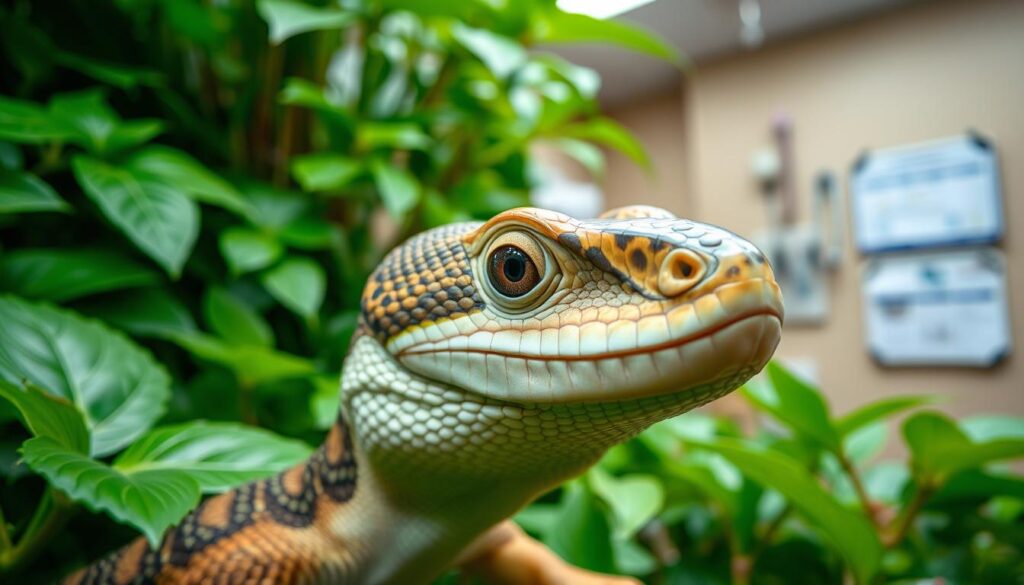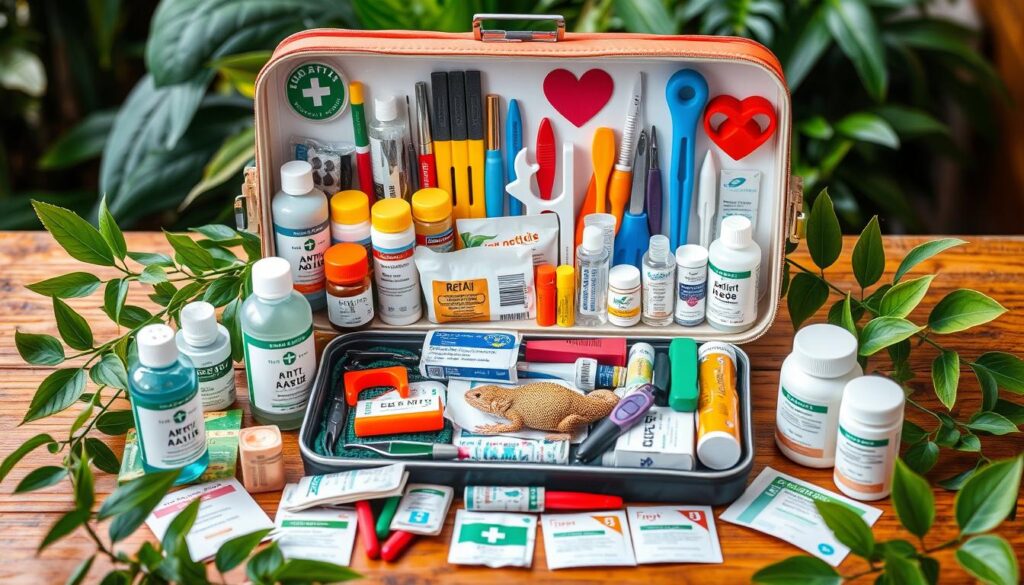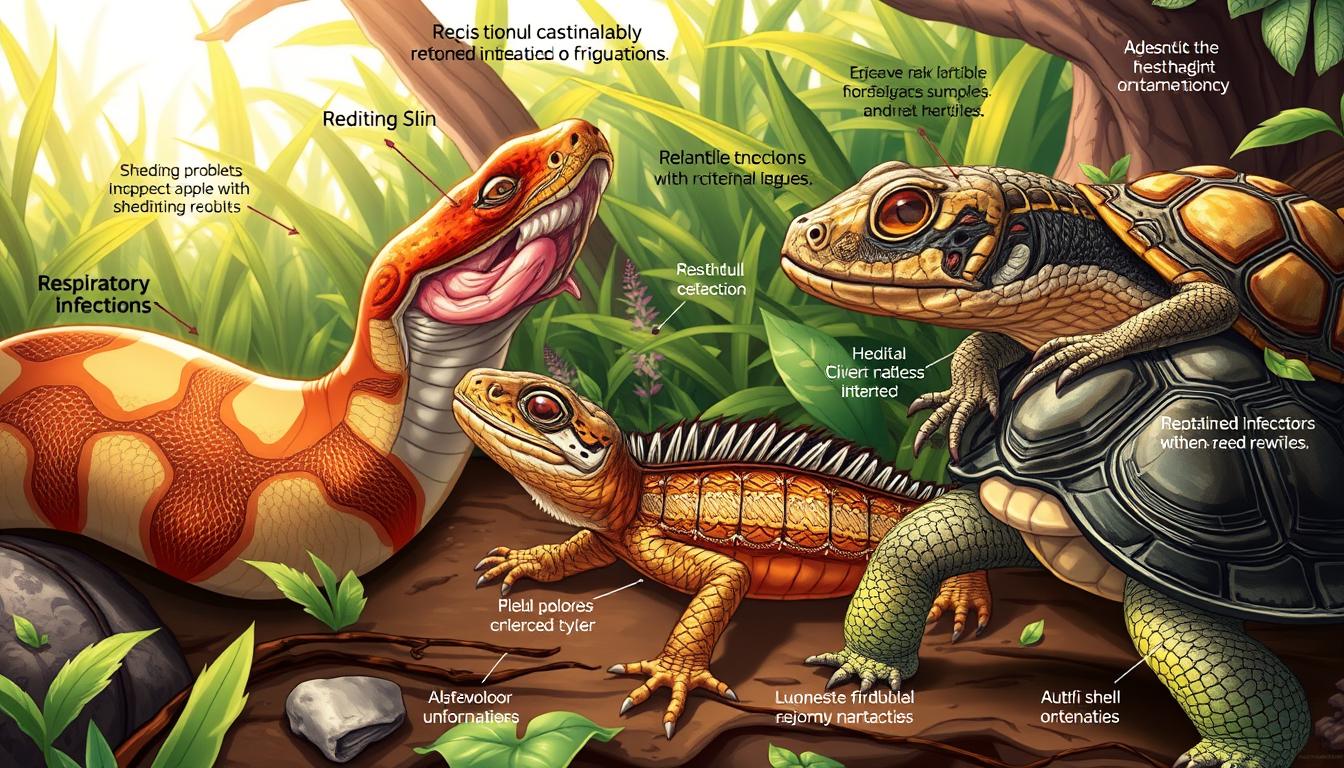Reptile owners in the United States face unique challenges in keeping their pets healthy. Common health issues in reptiles can be hard to spot and fix. These problems often come from bad care and the wrong environment. Knowing these causes is key to stopping and handling reptile health issues.
Keeping reptiles healthy starts with good care and the right environment. Treating reptile health problems can be expensive and take a lot of time. So, it’s important for owners to watch their pet’s health closely. By knowing the risks and taking steps to avoid them, owners can help their reptile live a long, healthy life.
Reptile owners need to know about common health issues and act early to prevent them. This means giving the right environment, a balanced diet, and regular vet visits. By doing these things, owners can lower the chance of health problems and make sure their pet is happy and healthy.
Key Takeaways
- Common health issues in reptiles can be difficult to identify and address
- Reptile health problems can arise from improper care and environmental conditions
- Proper care and attention to the animal’s environment can help prevent common health issues in reptiles
- Regular veterinary check-ups are essential for maintaining reptile health
- Reptile owners must be knowledgeable about common health issues in reptiles to provide proper care
- Preventive measures can help reduce the risk of reptile health problems
Understanding Common Health Issues in Reptiles
Reptile health issues can be complex and varied. It’s crucial for owners to know the common problems that can affect their pets. These issues range from respiratory infections to metabolic bone disease. Knowing the signs of a healthy reptile is key to spotting health problems early.
A healthy reptile shows normal behavior like basking, eating, and interacting with its environment. Physical appearance is also a key indicator of health. Healthy reptiles have shiny scales, clear eyes, and a strong build. But, changes in appetite, behavior, or appearance can signal health issues. Owners should watch their pets closely for any signs of illness.
Signs of a Healthy Reptile
- Normal behavior and appetite
- Shiny scales and clear eyes
- Robust build and active movement
Red Flags for Health Problems
- Changes in appetite or behavior
- Discoloration or dullness of scales
- Discharge or swelling around the eyes or nose
Impact of Environment on Reptile Health
Environmental factors like temperature, humidity, and lighting greatly affect reptile health. Proper habitat management is vital in preventing health issues. Owners should research and understand their reptile species’ specific needs to provide the best care.
The Importance of Proper Habitat Management
Proper habitat management is key for reptile health management. It directly affects the reptile’s well-being. A well-designed habitat can prevent health issues. On the other hand, a poorly designed one can cause many problems.
When setting up a habitat, consider several factors. These include temperature gradients, humidity levels, lighting, and substrate choices.
Here are some key considerations for creating an optimal habitat:
- Temperature gradients: Provide a range of temperatures to allow the reptile to regulate its body temperature.
- Humidity levels: Maintain a suitable humidity level to prevent respiratory issues and promote healthy skin.
- Lighting: Offer a combination of UVB and visible light to support calcium metabolism and prevent metabolic bone disease.
- Substrate choices: Select a substrate that is safe, easy to clean, and provides a comfortable surface for the reptile to move around on.
By carefully managing these factors, reptile owners can create a healthy and thriving environment for their pets.
Effective reptile health management also involves regular monitoring of the habitat. This includes checking temperature and humidity levels, cleaning the habitat, and providing a balanced diet. By taking a proactive approach to habitat management, reptile owners can help prevent health issues and ensure their pets lead long, healthy lives.
| Habitat Factor | Importance for Reptile Health |
|---|---|
| Temperature Gradients | Regulates body temperature, prevents heat stress |
| Humidity Levels | Prevents respiratory issues, promotes healthy skin |
| Lighting | Supports calcium metabolism, prevents metabolic bone disease |
| Substrate Choices | Provides a safe, comfortable surface for movement |
Respiratory Infections and Their Treatment
Reptile health concerns, like respiratory infections, are big worries for owners. Treating these diseases needs a full plan, including finding the cause, treating it, and stopping it from happening again. Symptoms of respiratory infections in reptiles include wheezing, open-mouth breathing, or nasal discharge.
To treat reptile diseases, finding the root cause is key. This involves a physical check-up, lab tests, and imaging. After finding the cause, treatments like antibiotics, supportive care, and changing the environment can be tried.
Identifying Respiratory Issues
Reptile owners should know the signs of respiratory problems. These include:
- Wheezing or trouble breathing
- Open-mouth breathing
- Nasal discharge or swelling
- Loss of appetite or feeling very tired
Treatment Options
Treatment for respiratory infections in reptiles varies based on the cause and how bad it is. Options include:
- Antibiotics for bacterial infections
- Supportive care, like a warm, humid space
- Changing the environment, like better air flow or less stress

Prevention Strategies
To stop respiratory infections in reptiles, owners need to act early. This includes:
| Prevention Strategy | Description |
|---|---|
| Proper temperature and humidity control | Keeping the right temperature and humidity can prevent respiratory problems |
| Regular cleaning and disinfection | Cleaning and disinfecting the reptile’s home can lower infection risk |
| Providing a balanced diet | Feeding a balanced diet helps keep the reptile’s immune system strong |
Understanding respiratory infections in reptiles helps owners prevent and manage them. This promotes better health and well-being for reptiles.
Metabolic Bone Disease: Prevention and Care
Reptile health problems, like metabolic bone disease (MBD), can be very serious. MBD makes bones soft or deformed. It often happens because of bad diet and not enough UVB light.
To stop MBD, it’s key to give the right calcium and UVB light. Owners can prevent it by researching what their reptile needs. For instance, a balanced diet with calcium and vitamin D3 helps a lot.
Some important ways to prevent MBD include:
- Feeding a diet rich in calcium and vitamin D3
- Having enough UVB light to help bones absorb calcium
- Making a good home with the right temperature and humidity
Spotting MBD early and getting help fast is crucial. Owners should watch for signs like soft or bent bones. If they see these signs, they should get their reptile to the vet right away. By preventing MBD and getting quick treatment, owners can keep their reptiles healthy and happy.
| Prevention Strategy | Description |
|---|---|
| Proper Calcium Supplementation | Providing a balanced diet that includes calcium and vitamin D3 |
| Adequate UVB Lighting | Ensuring adequate UVB lighting to promote calcium absorption |
| Suitable Environment | Creating a suitable environment that includes a temperature gradient and humidity levels |
Parasitic Infections in Reptiles
Reptiles often face common health issues, with parasitic infections being a big problem. These can be inside the body, like worms, or outside, like mites. It’s key to check their feces often to catch these parasites early. This helps in treating them quickly and stopping more problems.
Some common internal parasites include:
- Hookworms
- Roundworms
- Tapeworms
These can make reptiles lose weight, feel tired, have diarrhea, or throw up. Outside parasites can cause skin problems, anemia, and infections.
- Keep things clean and hygienic
- Feed them well and on time
- Make sure they have good air and the right temperature
Seeing a vet regularly and getting fecal exams can spot common health issues in reptiles early. This makes it easier to treating reptile diseases and avoid serious harm.
| Parasite | Symptoms | Treatment |
|---|---|---|
| Hookworms | Weight loss, diarrhea | Deworming medication |
| Mites | Skin irritation, anemia | Topical treatments, environmental cleaning |
Skin Problems and Shedding Issues
Reptile owners often worry about skin problems and shedding issues. Abnormal shedding is a common sign of illness. Reptiles shed their skin as they grow, but problems can lead to serious health issues.
Scale rot and fungal infections are common skin problems in reptiles. These can be caused by poor humidity, bad temperature, and dirty living spaces. Keeping humidity right and a clean, well-ventilated home is key.
Owners can help their reptiles shed healthily by creating the right environment. This means keeping the right temperature and humidity, feeding a balanced diet, and making sure they have clean water and a clean home. Knowing about common health issues and taking steps to prevent them can help reptiles live long, healthy lives.
Here are some important things to consider for reptile skin problems and shedding issues:
- Maintaining optimal humidity levels to facilitate proper shedding
- Providing a balanced and nutritious diet to support overall health
- Ensuring access to fresh water and a clean living space to prevent infection
- Monitoring reptile health closely to identify potential issues early
Nutritional Deficiencies and Dietary Concerns
Proper nutrition is key for reptile health management. A balanced diet prevents many reptile health problems. Without the right nutrients, reptiles can suffer from metabolic bone disease, respiratory issues, and weak immune systems. The Veterinary Information Network stresses the importance of a good diet for reptiles.
Different reptiles need different diets. Herbivores need lots of fiber, while carnivores need more protein.
Essential Nutrients
Reptiles need calcium, vitamin D3, and protein. Without these, they can get sick with metabolic bone disease, secondary hyperparathyroidism, and muscle loss.
To keep reptiles healthy, owners should follow
Feeding Guidelines
specific to their pet. This means giving a varied diet and adding vitamins and minerals when needed. A
Supplementation Requirements
list should include calcium, vitamin D3, and other key nutrients. By following these tips, owners can keep their reptiles healthy and happy.
- Providing a varied diet that meets the reptile’s nutritional needs
- Supplementing with vitamins and minerals as necessary
- Avoiding over-supplementation, which can lead to toxicity
- Monitoring the reptile’s health and adjusting the diet as needed
By focusing on proper nutrition and reptile health management, owners can avoid reptile health problems. This ensures their pets live long, healthy lives.
Temperature-Related Health Problems
Reptile health can be greatly affected by bad temperature control. It’s key to keep the right temperature zones in reptile homes to stop sickness like being too tired or basking too much. Each reptile type needs its own temperature area, which can be hard for owners to set up.
Hypothermia and overheating are big health issues for reptiles. Hypothermia happens when a reptile gets too cold, leading to health problems. Overheating can cause dehydration, heat stress, and even death. It’s vital to check the temperature often to keep reptiles healthy.
To make a good home for reptiles, owners can use heat lamps or mats. But, it’s important to follow the maker’s rules and watch the temperature closely. A temperature range should be set up so reptiles can control their own heat. This can be done by having a warm spot and a cooler area in the enclosure.
Reptile owners should know the signs of temperature stress, like changes in eating, acting, or skin. If these signs show up, seeing a vet is a must to find and fix the problem. Keeping the right temperature and watching for health issues can help prevent sickness and keep reptiles healthy for a long time.
Reproductive Health Issues
Reptile health concerns, especially reproductive ones, are key to their overall well-being. Issues like reproductive problems can greatly affect their health and lifespan. One major issue is egg binding, also known as dystocia.
Egg binding happens when a female reptile can’t lay her eggs. This can be due to dehydration, poor nutrition, or stress. It can cause infections, organ damage, and even death. Owners should watch for signs like lethargy, loss of appetite, and swollen bellies.
Egg Binding
To treat egg binding, reptiles need a warm, humid place to lay eggs. They must also stay hydrated and eat well. Sometimes, a vet’s help is needed to aid in laying eggs or treat related health problems.

Breeding-Related Stress
Breeding stress is another big issue for reptiles. It can come from bad nutrition, poor living conditions, and wrong breeding methods. Owners must focus on their reptiles’ health, especially when breeding, to avoid stress and health problems.
By tackling these reproductive health issues, owners can keep their reptiles healthy. This reduces the chance of common health problems and helps the reptile population thrive.
When to Seek Veterinary Care
Reptile owners often struggle to know when their pets need a vet. Getting reptile veterinary care is key to treating diseases and keeping them healthy. Regular check-ups and care can spot health problems early.
In emergencies like severe injuries or breathing issues, get help fast. A reptile vet can give the right treatment and advice for your pet’s health.
Emergency Situations
- Severe injuries, such as cuts or fractures
- Prolonged anorexia or refusal to eat
- Difficulty breathing or respiratory distress
- Sudden changes in behavior or appearance
Finding a Reptile Veterinarian
It’s important to find a vet with reptile care experience. They need to know how to meet reptiles’ special needs. This ensures your pet gets the best care for any diseases.
Regular vet visits and care can prevent diseases. Working with a skilled reptile vet helps keep your pet healthy. This way, you can enjoy a long, happy life with your reptile.
| Reptile Health Issue | Symptoms | Treatment |
|---|---|---|
| Respiratory Infections | Coughing, wheezing, difficulty breathing | Antibiotics, supportive care |
| Metabolic Bone Disease | Softening of bones, deformities | Calcium and vitamin D3 supplements, dietary changes |
| Parasitic Infections | Weight loss, lethargy, changes in appetite | Deworming medication, supportive care |
Preventive Care and Regular Health Monitoring
Regular health checks are key for reptile health management. They help spot problems early. Owners can catch signs of illness or injury, like changes in appetite or skin.
Some important things to watch for include:
- Body condition: Look for weight loss, lethargy, or changes in skin and scales.
- Eating and defecation habits: Keep an eye on appetite, stool quality, and how often they go.
- Environmental factors: Make sure the temperature, humidity, and lighting are right.
Keeping health records up to date and seeing the vet regularly is also vital. A vet who knows reptiles can offer advice on care and health checks.
By focusing on preventive care and regular checks, owners can avoid many reptile health concerns. This helps their pets live long, healthy lives.
| Health Aspect | Monitoring Frequency | Recommended Action |
|---|---|---|
| Body condition | Weekly | Consult a veterinarian if changes are observed |
| Eating and defecation habits | Daily | Adjust diet or environment as needed |
| Environmental factors | Daily | Ensure proper temperature, humidity, and lighting conditions |
Building a Reptile First Aid Kit
Being ready for emergencies is key to reptile health management. A good first aid kit is vital for treating diseases and injuries. It should have bandages, antiseptic wipes, and a thermometer.
Having the right supplies is crucial in emergencies. You’ll need items for wound care, rehydration, and setting up a temporary habitat.
Essential Supplies
- Bandages and gauze
- Antiseptic wipes and spray
- Thermometer
- Rehydration fluids
- Temporary habitat materials (e.g. a plastic container, heat source, and hiding places)

Emergency Care Guidelines
In emergencies, quick and proper care is vital. This includes cleaning wounds, giving rehydration fluids, and keeping the temperature stable. But remember, a first aid kit is not a replacement for a vet’s care. Always seek professional help for serious cases.
Conclusion: Ensuring Long-term Reptile Wellness
As we wrap up our look at reptile health issues, it’s clear that early action is key. Reptile health management is crucial for their well-being. Knowing the common health issues in reptiles helps owners spot problems early and fix them.
Good care includes the right habitat, food, and watching for illness signs. Quick vet visits are also important. Each part of reptile care affects their health and life span. With the right knowledge and a good vet, reptile owners can help their pets live well.
Keeping a reptile healthy is a rewarding journey that needs effort and commitment. By using the tips from this article, reptile lovers can enjoy many happy years with their pets.

